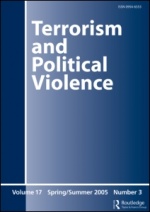Terrorism and Political Violence
First published in 1989 Terrorism and Political Violence is one of the two leading journals on terrorism, the other being Studies in Conflict and Terrorism. Both are published by Routledge part of the Taylor and Francis group, which is in turn part of the Informa Group which has helped to fund the Centre for the Study of Terrorism and Political Violence at St Andrews University.
Contents
Orientation
Terrorism and Political Violence has been strongly influenced by figures from the Centre for the Study of Terrorism and Political Violence at St Andrews University. Co-editor Alex Schmid is head of CSTPV, and associate editor Max Taylor is also a current CSTPV member. On the editorial board Bruce Hoffman and Paul Wilkinson are co-founders of CSTPV, whilst John Horgan and Rohan Gunaratna are also former CSTPV members.
In a 2005 article, British academics Jonny Burnett and Dave Whyte argue that:
The ‘terrorism’ that contributions to this journal focus on almost exclusively covers political violence directed against states, rather than by states. Where state terrorism does feature in analyses, it tends to be the political violence sponsored by states that are not allied to US or Western European countries (in other words, those described as ‘rogue states’). [1]
Burnett and Whyte argue that the inherent bias of the journal's research is not merely ideological but is the result of the research methodology employed by the experts associated with RAND and St Andrews. In particular they criticise the methodology employed in the compilation of the RAND-St Andrews database, which was published in the journal until it was discontinued.
Since the [RAND-St Andrews] chronology only records those incidents that are ‘international’, the database is orientated towards the recording of attacks on foreign visitors to, and military occupiers of, relatively poor countries. By definition those victims are normally business representatives and military personnel from economically strong, normally Western, nations. The second observation, which reinforces this latter point, is that the Chronology explicitly excludes acts of state terror committed by any government against its own citizens, and acts of violence occurring in war or in war-like situations. Incidents involving Western armies of occupation and businesses are included in the Chronology only where they are victims rather than the perpetrators of violence. Third, some of the methodological inconsistencies in the use of data in the Chronology database are reminiscent of the counter-insurgency position. It is possible to find non-violent activities and protests against state violence recorded in the database as ‘terrorism.’ [2]
Editorial Board circa 2014
Editors
- David Rapoport University of California, Los Angeles
- Max Taylor Pennsylvania State University, USA
Associate Editor
- Richard English University of St.Andrews, UK
Assistant Editor
- Lawrence Rubin - University of California, Los Angeles
Reviews Editor
- Jeff Kaplan - University of Wisconsin, Oshkosh
Editorial Board
- Max Abrahms - Northeastern University, USA
- Rogelio Alonso - King Joan Carlos University, Spain
- Kenneth Anderson - American University Law School, Washington, DC
- Michael Barkun - Syracuse University
- Mia Bloom - University of Massachussetts Lowell, USA
- Daniel Byman - Georgetown Univesity, USA
- Martha Crenshaw - Stanford University
- Adam Dolnik - University of Wollongong, Australia
- James J.F Forest - University of Massachussetts Lowell, and joint Special Operations University, USA
- Beatrice A.de Graaf - Leiden University, the Netherlands
- Dipak Gupta - San Diego State University, USA
- Christopher Harmon - MCU, Gray Research Center, USA
- Ron Hassner - University of California, Berkeley ,USA
- Thomas Hegghammer - Norwegian Defence Research Establishment (FFI), Norway
- Bruce Hoffman - Georgetown University, Washington, DC
- John Horgan - Pennsylvania State University
- Jeffrey Kaplan - University of Wisconsin, Oshkosh
- Michael Kenney - University of Pittsburgh, USA
- Brig. Gen. (Retd.) Kiran Krishan - Institute of Defence Studies and Analyses, India
- Clark McCauley - Bryn Mawr College, Bryn Mawr, Pennsylvania
- Barak Mendelsohn - Haverford College, USA
- Ariel Merari - Tel Aviv University
- Ami Pedahzur - University of Texas, Austin, USA
- Fernando Reinares - Real Instituto Elcano and Universidad Rey Juan Carlos, Madrid
- Marc Sageman - Foreign Policy Research Institute, Philadelphia, PA
- Todd Sandler - University of Texas, Dallas
- Harjit Sandhu - United Nations-ICTY
- Alex Schmid - Terrorism Research Institute (TRI), Austria
- Jacob Shapoiro - Princeton University, USA
- Andrew Silke - University of East London, UK
- Jeffrey D. Simon - Political Risk Assessment Co., Inc.
- Ekaterina Stepanova - Stockholm International Peace Research Institute (SIPRI)
- Leonard Weinberg - University of Nevada, Reno
- Amy Zegart - University of California, Los Angeles
Notes
- ↑ Jonny Burnett & Dave Whyte, 'Embedded Expertise and the New Terrorism (PDF)', Journal for Crime, Conflict and the Media 1 (4) p.9
- ↑ Jonny Burnett & Dave Whyte, 'Embedded Expertise and the New Terrorism (PDF)', Journal for Crime, Conflict and the Media 1 (4) pp.9-10
